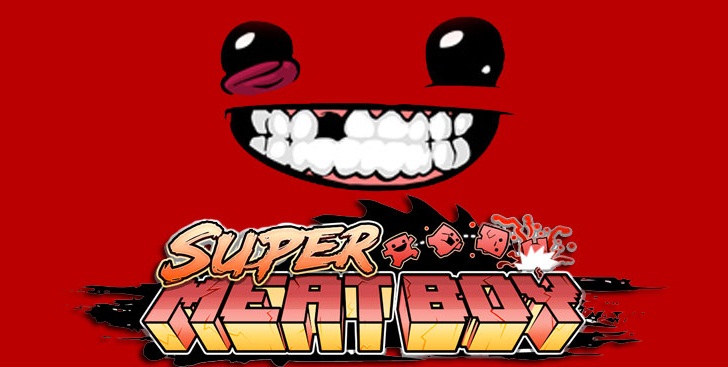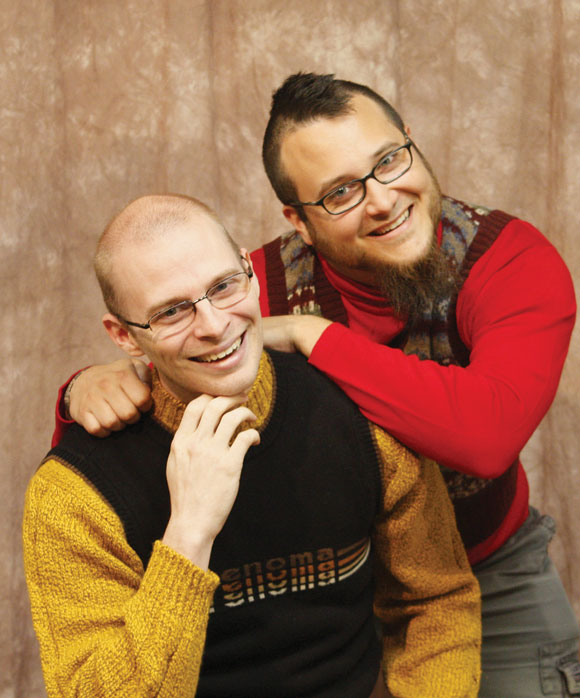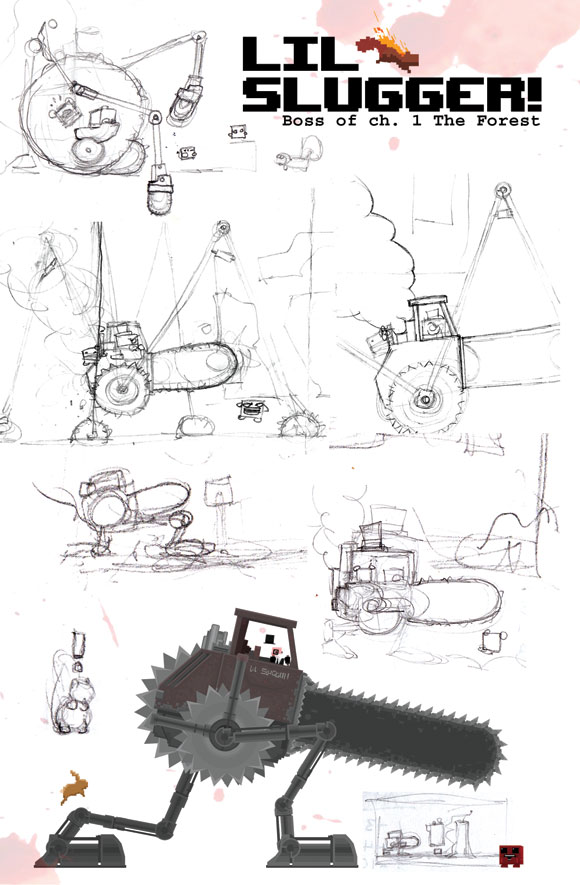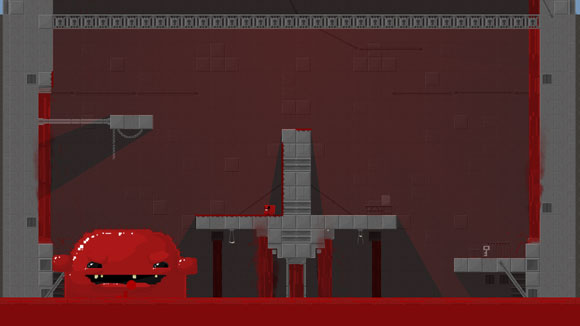Post mortem Super Meat Boy

When I was in middle school, I sketched for a stunning video game full of blood, huge bosses, epic worlds and a plot leading the immortal hero through hell, the end of the world and beyond.
Then I grew up ... but little has changed.
')
Super Meat Boy began as a simple prototype in Flash, which we created in free time with my friend from the Internet, John McEntee, in three weeks. I had no idea that it would become one of my most popular games in Flash, not to mention the release of a full-scale console game.
In 2008, I was hired by Microsoft and Nintendo to create something for their online stores. Initially, I wanted to do for Microsoft Gish 2 , and Nintendo was more interested in the enhanced version of Aether , but the main factor that influenced me was the chance friendship.
I met Tommy Refenes in 2008. Over the years, I have worked with many programmers, and the relationship between artists and programmers has always been a little alienated. Working with Tommy was like talking to a best friend from college; we were crazy and threw out tricks that infuriated everyone around. I immediately realized that any of our joint project would be interesting, and that’s exactly what Super Meat Boy turned out to be.
We just wanted to do something interesting and have fun creating this game.
The contract to create a console game has become a big breakthrough, our chance to show everyone who we are and what we can do. Without any pressure.

What we did well
1. We used our own engine and tools.
Tommy: When I tell people what I did the engine and tools myself, most ask: “Why?” My friends from FlashBang in every conversation tried to convince me to use Unity, but I firmly adhered to the decision to create my own development tools and engine.
The most important reason for this is the level of control. When it comes to code, I’m obsessed with control: I want to understand everything that happens in my codebase. Then, if something breaks, I will know exactly where it happened and how to fix it. In addition, I took up games to write them, not scripts. I like all aspects of game programming, from the engine to the gameplay. We are indie and we can do whatever we want, and thanks to my skills, I literally enjoy developing the engine.
It took 18 months to create Super Meat Boy , from the first line of the engine code to the last line of the error message code before being sent for XBLA certification. Personally, it seems to me that this is a record time for playing with such a volume of content for two developers. I’m sure we were able to handle this because I was in charge of the code. When an error occurred, I immediately tracked it, regardless of the platform on which it was detected.
Not many tools were used for Super Meat Boy . The in-game level editor turned out to be invaluable, because he allowed Edmund to create levels visually, without messing around with the code.
Another tool was the Flash Exporter created by me. In general, it was a script that packs all the Flash characters into one texture and exports animation information with sound tags. He justified himself in the first export made by Ed Meat Boy. We received sounds, animations and everything necessary for one quick export operation, which the engine could easily manage and call it if necessary.
2. Design environment
Edmund: Almost from the very beginning, both Tommy and I were a little strained by that very strict working environment that most developers advised us to stick with so that we would be taken seriously and we could achieve success.
I remember the day when we received a letter from Nintendo, in which we were asked to take photos of the developers and write our biographies. It seemed to us madness how seriously everyone perceives the industry, the purpose of which is to entertain.
That day Tommy and I bought the funniest sweaters we could find, went to Sears Photos and took a picture there that became a photo of our team. It seems that we also composed completely ridiculous biographies of the developers, which Nintendo then published in its press releases along with our photo.

Tommy Refenes and Edmund Macmillen
I want to say that the most important thing in our work was fun and interest. It was important for us that we always enjoy what we do, and we conveyed a love for our work in interviews, videos, at conferences, and in the design of the game itself.
Tommy and I became very close in the development process, and Super Meat Boy was the result of that. We enjoyed working on this game, and could not hold back our feelings when it came to making decisions. Super Meat Boy was a joke "for their own", which suddenly got out of hand. I think the most attractive thing about SMB is that any video game player can understand this joke.
3. Innovation in design: back to basics
Edmund: When Tommy and I talked about the possibility of a remake of the Mario formula, we never mentioned it in public. It was impossible to talk about Mario, even close to remember him, but as a designer, I would at least try.
Super Meat Boy is Super Mario Bros , but made by me and Tommy. If we wrote dizdok, then it would be just that.
That is, from this point of view, the design of the game had a very solid foundation, but over the previous 20 years the games have changed a lot. The developers have abandoned the complexity, simplicity and accessibility have become paramount.
We sought to bring back the complexity of that retro-era, and also to reinvent the very idea of complexity. The biggest part of the complexity of the old games was annoyance, from which, as we believed, you need to get rid of all means to give players a sense of completeness, not disappointing them.
At its core, this idea was very simple: remove life, reduce the respawn time, make the levels short, and the goals always visible. Over all of this, we added constant positive feedback, even death became something interesting, because after the player finally masters the level, he can watch an epic demonstration of all previous deaths. The function of the replay allowed us to remind the player that through his own actions he is improving. In addition, she reinforced the feeling of completeness, victory in difficult competition.
4. Soundtrack
Edmund: Danny Baranowski is a terrific musician, but in my opinion one of the reasons why his music matches the game was the internal workings of the system.
From the very beginning, I thought it important that Danny had all the rights to the music he created for the game. It seemed logical that the artist would invest more in his work if he feels that it reflects him. We wanted Danny to get all the income for his work, and it seemed logical.
Danny's work became an expression of his own personality. The music is crazy, obsessed, complex and full of life. All these elements were necessary for us for the SMB soundtrack, and this was achieved: we just gave Danny to create music that he could be proud of.
The SMB soundtrack has become a stunning addition to the game - it strengthens the heartbeat, enriches all aspects of the gameplay and is not forgotten for a long time. I think it all happened because we trusted Danny as an artist and just let him do what he is good at.

5. Steam
Tommy: Steam is a terrific platform, and I can't find the words to express my admiration in full. The ability to quickly release updates within just a few hours after detecting an error greatly simplified the release on the PC. If Steam had a different code update system, everything would have been more complicated.
In addition, Steam listens to its developers. The Steam team took into account our proposals on how to develop sales, and we, in turn, listened to them. Working with Steam has never been like the traditional relationship of a publisher and a developer; it looked like mutual cooperation in order to earn more money and release a quality game.
We love Steam.
Something went wrong
1. Personal expenses
Edmund: This is not to say that our personal expenses were a serious mistake, because they became a huge motivator for completing the game, but they definitely presented a problem in the last few months of development.
At some point I had to have an emergency gall bladder operation, which made a hole in my budget of 50 thousand dollars, because I could not afford insurance.
We didn’t have any real money at all, even all the comics we printed for GDC and PAX managed to get through barter: my wife made plush toys for sale in Newgrounds store in exchange for the cost of printing.
The situation was critical at several key development points, but I was on the verge of poverty for the last 10 years, so for me this did not become a big problem. And, frankly, we had much more serious problems.
Tommy: There was a period when my bank account was -800 dollars. It's bad when you go to the supermarket to buy Coke Zero and you get a refusal. It turned out that each of these Coke Zero cans cost me about $ 40.
2. Missed WiiWare
Tommy: When we initially announced the release of Super Meat Boy for WiiWare, we planned no more than 100 levels, without cutscenes and unlockable characters. We wanted to make a direct port of a flash game with some additions, and nothing more. Then we suffered, but I do not think that this is bad, because we made just the game that we wanted. The bad thing was that we could not publish the game for the Wii.
In the process of creating the game and adding content, it became clear to us that it would be almost impossible to fit into the limitations on the size of WiiWare. I have always subconsciously sought to publish, but cutting the game down to 50 MB meant removing a heap of content that was an integral part of the game.
Edmund: It still saddens me that we didn’t graduate from the Wii, and I would like that. When the publication in WiiWare became impossible, we considered the options for selling SMB in Wii retail stores, but alas, none of the publishers we met did not consider the Wii as a profitable investment at that stage of development. So we ended the story with the Wii.
3. Release on PC
Tommy: Publishing a game on multiple platforms is quite difficult for a team of two people. The release on the PC was a bit problematic due to the testing. It seemed to me that we have a sufficient set of test machines. We had computers from the minimum suitable for the game (Acer netbook) to powerful quad-cores. I believed that we considered all the options: we had ATI and NVidia video cards. But, obviously, this was not enough.
On the day of the release on the PC, we were overwhelmed with a bunch of error reports, crashes during startup and exit, and much more. For the first few days after graduation, I responded to about two thousand letters. I felt the same way as during the last spurt before releasing to XBLA: every time I repaired something, something else broke.
It was very difficult to move from release stress in XBLA to release on PC in one month. We had a sense of completeness, immediately replaced by a sense of failure. We will test the next game more thoroughly on a PC, and most likely we will outsource this task to outsourcing companies specializing in testing.

4. The last two months of hard work before releasing to XBLA
Edmund: At the end of August 2010, our producer from Microsoft called us. He told us what was coming autumn campaign, similar to the Summer of Arcade. At that moment, we had four more months left to complete, but in order to have time to graduate during this campaign, we had to get certified in two months.
Such a term looks impossible. We were told that if we do not have time for the autumn campaign, we will have to postpone the game until spring or try to release it ourselves, without much support. At the same time, we risked significant losses. Microsoft explained that all campaign games will have their own release week, very active coverage, Major Nelson reviews, and a demo on PAX and other events. This ad campaign was supposed to be called Game Feast.
At that time, our financial situation became dangerous and it seemed to us that if we did not get into this autumn campaign, then there would be no hope for us. We could not postpone until spring, and the release without the support of Microsoft was like suicide, so we decided to put everything on the line and try to catch what was planned for four months in two months. These two months were the worst in my life.
Pressure, workload and overall development stress were extremely draining. In those two months, we both didn’t have a single day off, we worked 10-12 hours a day. At the end of the development, it turned out that for several weeks I slept less than five hours a day. I remember my breakdown in September, when it seemed to me that we were stuck in some kind of nightmare, where one day was repeated again and again.

Tommy: Because of such tight deadlines, we added new functions in parallel with correcting errors, that is, every time I turned on the computer and checked the error database, all the work I had done the previous evening was useless. I worked and corrected 100 errors in the evening, reduced their number to 50, and the next morning there were already 200 errors.
It lasted for long weeks. I was weak, angry and tense. My parents brought me food because I literally did not leave the house during these two months. I remember how I constantly repeated to myself: “Do not die until you make the game,” because I was really afraid of this. I felt miserable, my blood sugar jumped . Per.: Tommy Refenes - diabetic] , but I had to plow and correct mistakes. I don’t know if it made me stronger ... but at least I somehow managed to survive!
Edmund: I think we hid from each other the complexity of the whole situation, so as not to push even more.
In the evenings, I often told my wife that I no longer could, I didn’t want to do this game anymore, it’s not worth it, and I’m willing to leave and survive all losses just to get back to normal life. She replied: “let's talk when you calm down,” I went to bed, got up after five hours and again lived the same day.
5. Release in XBLA
Edmund: The development process was completed, Super Meat Boy received several awards on PAX, and the press was already starting to target its spotlights on us. Many websites and magazines said that Super Meat Boy would easily become a Feast hit, and possibly a new major indie hit, but Microsoft businessmen were not sure.
We were told that the price is too high, the graphics are too rough, and the eye does not catch the eye, like other games for Game Feast: Comic Jumper and Hydrophobia . Our heart went to our heels when we were told that according to forecasts our game will be sold the same way as Hydrophobia , if not worse, but in their opinion, it will be the second most income game of Feast.
These forecasts disappointed even more after the release of Hydrophobia : according to statistics, in the first week less than 10 thousand people have played it. If Microsoft’s predictions were correct, then we were in full ...
A week later, Comic Jumper was released, to which the public reacted about the same, although sales were slightly better, but still not enough by XBLA standards. Game Feast seemed like a huge bomb, and some sites already wrote about it as a failure.
Super Meat Boy released on October 20th, along with Costume Quest . For four days, it was advertised third. We did not receive any promotional bonuses on release, like previous Game Feast games (exclusive release week, first advertising space and Major Nelson review), but we were told that if the score on Metacritic and sales are good, we will be advertised more actively.
By the third day after the release, we had already overtaken the total results of Hydrophobia and Comic Jumper for the week, on Metacritic, our game was in second place in the XBLA games list, and word of mouth spread information about it at insane speed.
We were placed in the first place in the advertisement on the fifth day, and they were never removed from there. We never received a Major Nelson review, as well as an explanation of why Microsoft released SMB along with Costume Quest . We were not told why, despite the fact that we exceeded all expectations, we were still not treated as promised, even when active advertising of other Game Feast games, such as Comic Jumper, continued.
Therefore, we were confused and it seemed to us that we were being used. I still do not understand why everything turned out that way. Maybe Microsoft just wanted to move away from Game Feast? Perhaps they did not believe in our success? Or maybe we were very unlucky at the most competitive time of the year for the video game industry?
Anyway, the biggest mistake in the development of SMB was that we were killed for the sake of advertising, from which, in essence, we received nothing.

Most meat
Tommy: It's hard to talk about some disappointment ... we haven't finished yet! We needed to finish the editor, portal and version for Mac. It was difficult, because we already felt that everything was over, as if we had crossed the finish line. But then it was as if someone said: “Do you want to take part in another race?”, And we are: “Yes, it will probably be fun.”
Edmund: And then you realize that this will be the same race, there will be no prize at the end, and at that moment you start to feel sick.
In my opinion, it was all worth it, because I was playing with a friend. If I did it with some stranger, with someone you can't joke with, then the whole process would be very sad and I would regret it.
Tommy: Overall, I feel that the game was worth all this stress. We started off as two simple guys without a single finished game, but ended up creating the fourth rated game for the PC of 2010, which sold 400,000 copies and received more than 15 awards Game of the Year.
Edmund: It was an honor to create a game in which we invested so much soul, and which was appreciated by so many. It's nice to be living proof that two college-drop guys with no money will be able to make a multiplatform console game at the cost of just a little brain injury.
Technical details
Developer: Team Meat
Number of developers: 1 Edmund, 1 Tommy, 1 Danny
Development time: 18 months
Release Date: October 20, 2010 (XBLA), November 30, 2010 (Steam)
Platform: Xbox 360, PC
Source: https://habr.com/ru/post/332984/
All Articles